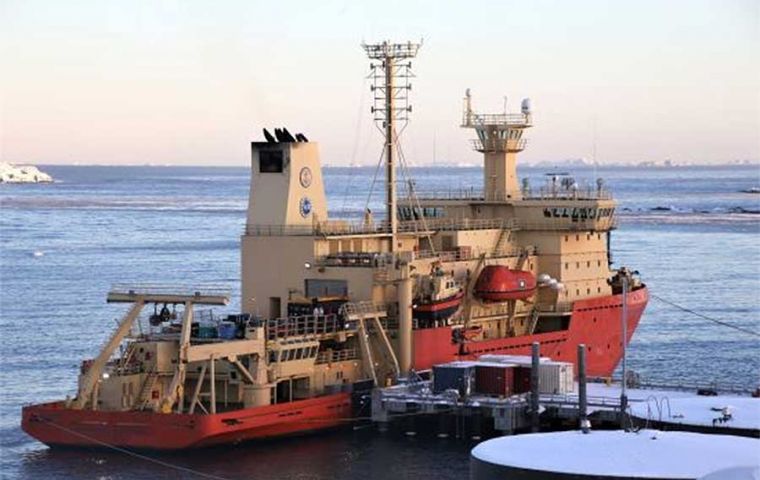MercoPress. South Atlantic News Agency
Bad news for Punta Arenas: NFS Antarctic researchers and icebreakers return to US
 Built in 1992, the Palmer is a 7,600-ton icebreaker capable of breaking 3 feet (1 meter) of ice at 3 knots. It is 308 feet (94 meters) long and has 12,720 horsepower.
Built in 1992, the Palmer is a 7,600-ton icebreaker capable of breaking 3 feet (1 meter) of ice at 3 knots. It is 308 feet (94 meters) long and has 12,720 horsepower. Severe cuts in Budget resources for the United States National Science Foundation, (NSF) dictated by president Donald Trump are having an impact on Antarctic research, and a huge financial loss for the community of Punta Arenas, Magallanes Region, extreme south of Chile, according to polar scientists.
In effect Santiago’s main daily El Mercurio is reporting that following three decades the US Antarctic research vessel and icebreaker, “Nathaniel B. Palmer” is returning to its home town in the US because of budget cuts and despite a request last July from 170 polar scientists calling on NFS and Capitol Hill to reconsider the decision.
This follows a decision a few months ago to withdraw the icebreaker “Laurence M. Gould”, also working for NSF, which means the US scientific presence in Punta Arenas, standing since 1995, will be coming to an end.
Since then and each Antarctic season the two vessels represented a huge input to Punta Arenas community with the supply of all the provisions, resources and logistics, such as port facilities, fuel, food, lodging, plus all the air and land traffic when crews and scientists were replaced.
This represented at least six million US dollars annually for Punta Arenas according to Mayor Claudio Radonich who recalls statements from a former US ambassador to Chile, Bernadette Meehan, during a conference on Antarctica at the local Chilean Antarctic Institute.
Ricardo Carcamo, senior manager of the maritime supplier BAM and regional president of the association of maritime suppliers, (Asonave) admitted to El Mercurio, “this is very bad news for Punta Arenas, and there is no clear replacement on sight. For thirty years the US has had Punta Arenas as its base port for, and natural access to Antarctica, and all this now is over, as I said terrible news for Punta Arenas”.
Carcamo anyhow sincerely hopes the situation will be temporary, since the budget cuts are linked to the specific current US administration. “I believe US scientists will continue to come but in much lesser numbers and with no vessels”




Top Comments
Disclaimer & comment rulesCommenting for this story is now closed.
If you have a Facebook account, become a fan and comment on our Facebook Page!